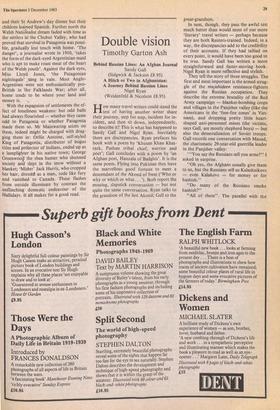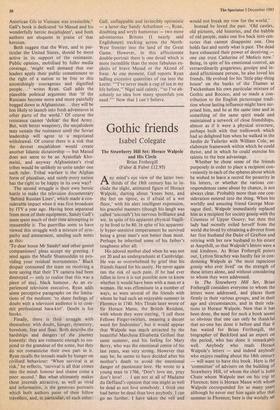Double vision
Timothy Garton Ash
How many travel writers could stand the test of having another writer share their journey, step for step, incident for in- cident, and then sit down, independently, to describe it? This is what has happened to Sandy Gall and Nigel Ryan. Inevitably there are discrepancies. Ryan prefaces his book with a poem by `Khusan Khan Khat- tack, Pathan tribal chief, warrior and poet'; Gall concludes with a poem by 'an Afghan poet, Hanzala of Badghis'. It is the same poem. Flying into Pakistan they have the marvellous good fortune to meet a descendant of the Akond of Swat ('Who or why or which or what . '). Both report the ensuing, slapstick conversation — but not quite the same conversation. Ryan talks to the grandson of the last Akond; Gall to the
great-grandson.
In sum, though, they pass the awful test much better than would most of our more 'literary' travel writers — perhaps because they are both Reuters-trained. Indeed, in a way, the discrepancies add to the credibility of their accounts. If they had tallied on every point, it would have been too good to be true. Sandy Gall has written a more straightforward and faster-moving book. Nigel Ryan is more reflective and stylish.
They tell the story of three struggles. The first and most important is the armed strug- gle of the mujahideen resistance-fighters against the Russian occupation. They describe the extreme brutality of the Red Army campaign — blanket-bombing crops and villages in the Panjsher valley (like the Americans in the 'free-fire zones' in Viet- nam), and dropping pretty little heart- shaped anti-personnel mines (the victims, says Gall, are mostly shepherd boys) — but also the demoralisation of Soviet troops. Gall records one conversation with Masud, the charismatic 29-year-old guerrilla leader in the Panjsher valley:
"You say the Russians sell you arms?" I asked in surprise.
"Oh yes, the Afghans usually give them to us, but the Russians sell us Kalashnikovs — even Kalakovs — for money or for hashish."
"Do many of the Russians smoke hashish?"
"All of them". The parallel with the American GIs in Vietnam was irresistible.' Gall's book is dedicated `to Masud and his wonderfully heroic mujahideen', and both authors are eloquent in praise of that heroism.
Both suggest that the West, and in par- ticular the United States, should be more active in its support of the resistance. Public opinion, mobilised by fuller media coverage, 'might well demand that our leaders apply their public commitment to the right of a nation to be free to this astonishingly courageous and dignified people.. . ' writes Ryan. Gall adds the plausible political argument that 'If the Russians become more and more painfully bogged down in Afghanistan ... they will be less likely to launch into fresh adventures in other parts of the world.' Of course the resistance cannot 'defeat' the Red Army. But, with better weaponry, the mujahideen may sustain the resistance until the Soviet leadership will agree to a negotiated withdrawal. Of course there is a risk that the devout mujahideen would create another Islamic dictatorship — but Masud does not seem to be an Ayatollah Kho- meini, and anyway Afghanistan's rival tribes would be unlikely to unite under one such ruler. Tribal warfare is the Afghan form of pluralism, and surely every nation has the right to be happy in its own way?
The second struggle is their own heroic battle to make the television documentary 'Behind Russian Lines', which made a con- siderable impact when it was first broadcast by ITV a year ago. Having been separated from most of their equipment, Sandy Gall's team spent much of their time attempting to reassemble it. The guerrillas seem to have viewed this struggle with a mixture of sym- pathy and amusement, sending such notes as this: `To dear houst Mr Sandy! and other gentel companiones! pleas accept my greeting. send again the Mudir Shamsoddin to pro- viding your residual instrumentes.' Black despair consumed the team on receiving a note saying that their TV camera had been destroyed — only to realise that this was a piece of muj. black humour. As an ex- perienced television executive, Ryan adds some perceptive paragraphs on the limita- tions of the medium: `to share feelings of doubt with a television audience is to com- mit professional hara-kiri'. Doubt is for books.
Finally, there is their struggle with themselves: with doubt, hunger, dysentery, boredom, fear and fleas. Both describe the hardships and dangers of the journey honestly: they are romantic enough to res- pond to the grandeur of the scene, but they do not romanticise their own part in it. Ryan recalls the inroads made by hunger on civilised behaviour: 'When survival is at risk,' he reflects, 'survival is all that comes into the mind: honour and shame come a poor second.' But what ultimately makes these journals attractive, as well as vivid and informative, is the generous portraits which both authors paint of their fellow travellers, and, in particular, of each other:
Gall, unflappable and invincibly optimistic — a latter-day Sandy Arbuthnot —, Ryan, doubting and wryly humorous — two more adventurous Britons (I nearly said Englishmen) trecking across the North- West frontier into the land of the Great Game. However, in this affectionate double-portrait there is one detail which is more incredible than the most fabulous ex- ploits of brave Masud or the Akond of Swat. At one moment, Gall reports Ryan ladling excessive quantities of tea into the kettle: 'I've never made a cup of tea in my life before," Nigel said calmly, "so I've ab- solutely no idea how many spoonfuls you need."' Now that I can't believe.















































 Previous page
Previous page